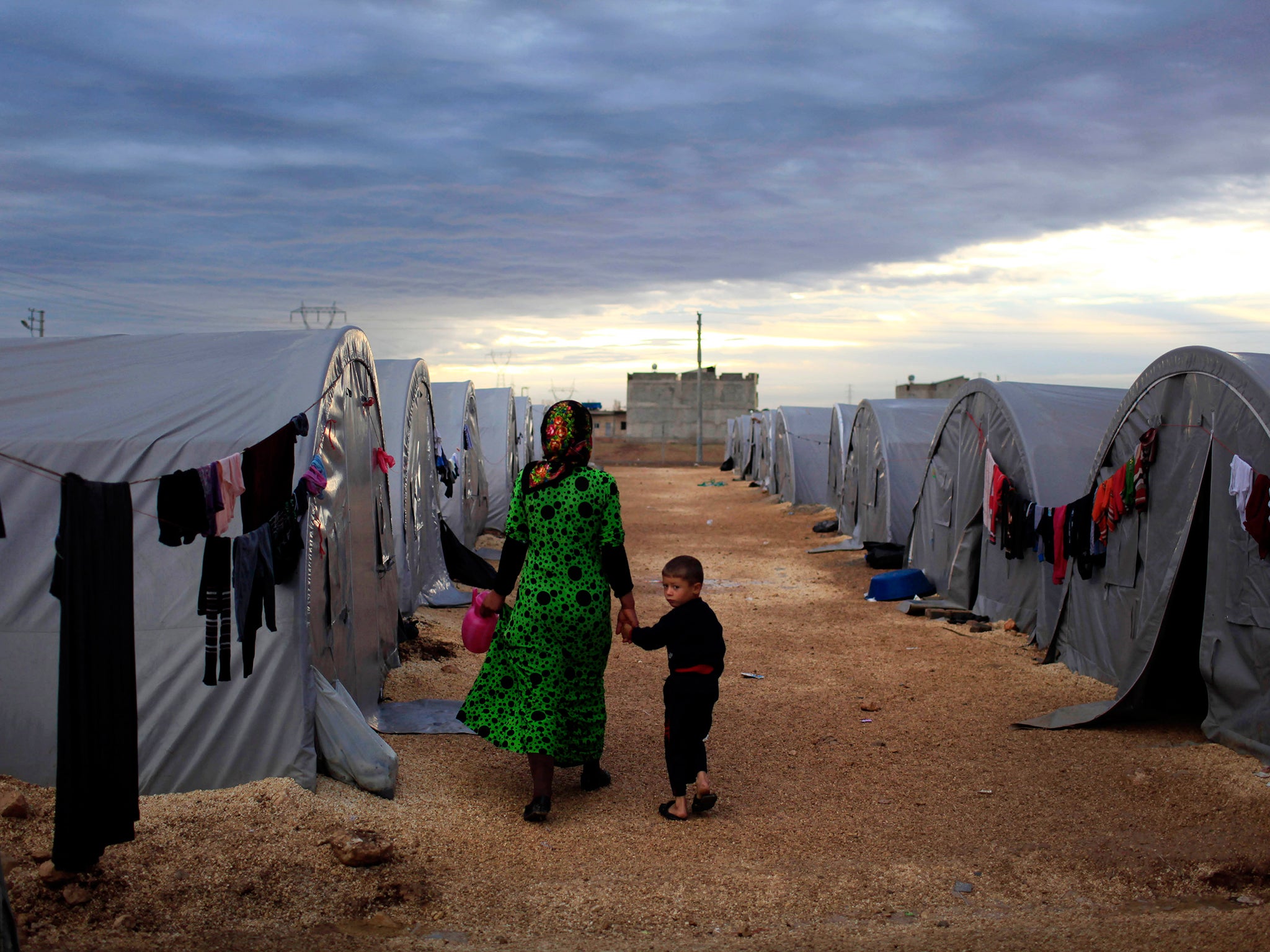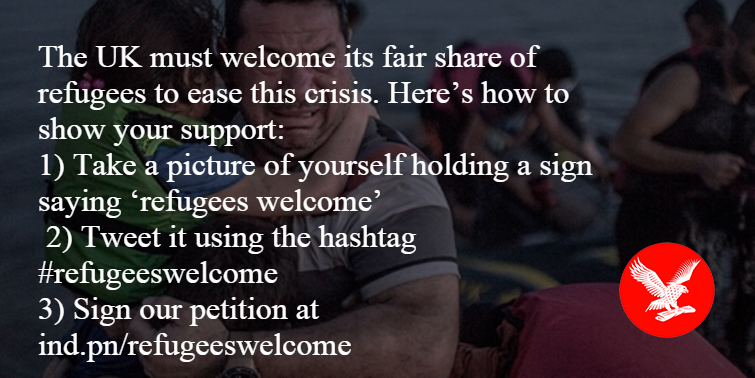Refugee crisis: Britain will have to accept many more than we have committed to so far – as indeed we should have long ago
At last, David Cameron has given a commitment to help refugees from Syria’s pitiless wars

Your support helps us to tell the story
From reproductive rights to climate change to Big Tech, The Independent is on the ground when the story is developing. Whether it's investigating the financials of Elon Musk's pro-Trump PAC or producing our latest documentary, 'The A Word', which shines a light on the American women fighting for reproductive rights, we know how important it is to parse out the facts from the messaging.
At such a critical moment in US history, we need reporters on the ground. Your donation allows us to keep sending journalists to speak to both sides of the story.
The Independent is trusted by Americans across the entire political spectrum. And unlike many other quality news outlets, we choose not to lock Americans out of our reporting and analysis with paywalls. We believe quality journalism should be available to everyone, paid for by those who can afford it.
Your support makes all the difference.Too little, too late, Prime Minister
At last, after many months of living in apparent denial of the scale of the humanitarian crisis, the Prime Minister has at last given a concrete commitment to help refugees from Syria’s pitiless wars. We are told that Britain – one of the richest nations on the planet – can find places for around 20,000 refugees. For those 20,000 that is obviously welcome relief. For the many hundreds of thousands who will remain stateless as a result of this modest effort, it is less good news. For those in this country whose consciences have been troubled by what they see happening – with men, women and children drowning every week as they make that perilous journey across the Mediterranean, whether caught on camera or not - it is hardly a moral solution, though the figure is larger than the spin at the weekend suggested.
A failure to respond
When nations as poor and beleaguered as Lebanon and Jordan have provided shelter for millions, when Germany has found 20 or more places for every one that Britain is to provide, and when we have taken in far larger figures in previous exoduses from Uganda, Vietnam and Kosovo, for example, it is an inadequate response, materially and morally. Estimates of how many the UK would be asked to house under a rational EU quota system for refugees vary, but are all somewhat larger than the Government’s commitment. In any case, we are no nearer that sharing of the burden across the European Union’s member states, and, given the open hostility being expressed in Budapest, Prague and Bratislava it is unlikely to materialise.
There are so many echoes of the movements of people during and after the Second World War that such sentiments are hard to reconcile with history. It was the peoples of eastern and central Europe, after all, who suffered greatly from dispossession, and who had to walk hundreds of miles or escape across the Iron Curtain to escape tyranny and persecution. With no great attempt at explicit atonement, the peoples of Germany and Austria have shown that they are willing to heed the past in a way that their neighbours’ governments seem incapable of.
Perverse choice of refugees
In Britain, financially, we are told, the funding will be taken form the overseas aid budget, which is not as mean as it sounds. If these refugees were otherwise to be beneficiaries of ur help in Bournemouth, say, rather than a camp in the Beqaa Valley, then there is no matter of principle involved. In a year’s time, when the funding is due to wind down, the Government should ensure that those local authorities and communities who have been most welcoming are not then pleased by having to make further cuts in public services, or increase council tax, because they have done the right thing.
The wider point is that those refugees from Syria now scattered across Europe will not be eligible for shelter in Britain, as the places available will be reserved for those in the camps of Lebanon and Jordan. And yet it is those families who have managed to drag themselves into Europe who have demonstrated their wish to come here. It is a perverse selection that forbids them entry when they are so near to asylum.
The mythology of air power
There are other, still less attractive, aspects of the government’s policy. George Osborne and David Cameron claim that had Parliament voted for air strikes in Syria in 2013, then that nation would not be in the mess it is in today. The further implication is that it was the fault of the Labour Party, and specifically its then leader Ed Miliband, not to back the policy, and its failure in the Commons led directly to the United States then scaling back its intervention in Syria. “Don’t blame us, guv” is the all-too clear message. This is disingenuous. For those airstrikes were to be aimed rarely at the Assad regime, and not at Isis. If anything they would have assisted Isis fighter son the ground, which was hardly the aim. When Patrick Cockburn warned the West of the rise of Isis he showed that they were goring in strength in their own right, abetted by whatever arms and ammunition Western powers were able to get the multi-faceted and fractious “Syrian resistance”. Isis did not need the US Air Force or the RAF to conduct their barbaric campaign, but we would certainly have been inadvertently helping them had we taken out President Assad’s control and command centres. By now they would probably be in the presidential palace in Damascus.
The case for bombing Isis now is much clearer, though it is true that Assad’s forces have killed even more Syrians than his fundamentalist opponents. Clear – but not convincing. For there are already plentiful armed forces in the air and on the ground taking on Isis, and form much more powerful powers in the region than the UK; the US, Turkey, the Gulf states, Kurdish fighters and, of course, Iran are all engaged in taking the battle to Isis. A few RAF fighter-bomber raids are not going to make the difference between success and failure in that particular conflict. More, as is already the case, having the West align itself, in effect, with a Hsia-dominated, Iranian-directed campaign dies the cause a good deal of harm. Many Syrians fear and loath Isis, but they may not feel much warmer about their prospective “liberators”. That, after all, has been the long-term experience of Western forces in Iraq since the illegal invasion of 2003. However bad thing may be, the intervention of Americans and Europeans can easily make things still worse. “Safe havens” and no-fly zones sound like an answer, until they become targets for Isis.
No end of a lesson
For those who argue ‘something must be done’ about Isis, that failure of Western action is an uncomfortable fact. Indeed, arguably, Isis was created by the war started by Tony Blair and George W Bush. British commanders on the ground told us in Iraq that we had “become the problem”. Isis are not people predisposed to negotiate with anyone, and there is little hope of a political settlement with them. Absent a military solution, then, and absent a political one, the refugee crisis is unlikely to subside. And Britain will, in due course, have to accept many more than we have committed to so far, as indeed we should have long ago.

Join our commenting forum
Join thought-provoking conversations, follow other Independent readers and see their replies
Comments